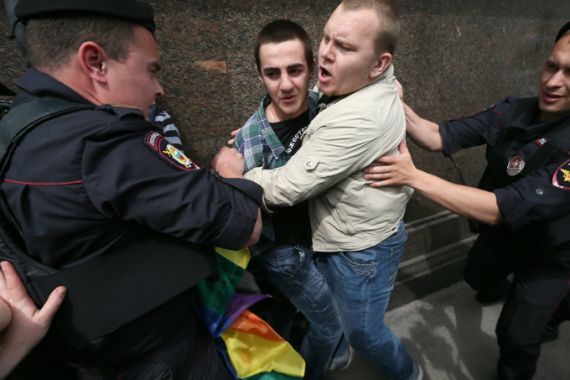Arrests made at gay rights protest in Russia
Police detain about 30 protesters at march in Moscow, where gay rights demonstrations are illegal.

Russian police detained about 30 pro and anti-gay activists in central Moscow, imposing the city’s ban on gay rights demonstrations.
The arrests on Saturday, underlining Russia’s tough response to public demonstrations by gay groups, coincided with the first ever gay rally in neighbouring Ukraine, which was allowed by the authorities and protected by the police.
Russia’s parliament has given preliminary approval to a ban on “homosexual propaganda” targeting minors, which critics say would effectively ban gay rights demonstrations.
The legislation has prompted condemnation from abroad, but President Vladimir Putin has rejected that criticism, saying Russia did not discriminate against gay people.
Putin’s traditional support base is among conservative voters, including Russian Orthodox followers, some of whom turned up to show their disapproval of Saturday’s rally.
A few dozen gay rights activists gathered in front of the Duma parliament building, as well as on a nearby square.
‘An outrage’
“It’s an outrage that they didn’t allow a gay parade … but I’m glad there weren’t fights as in Georgia,” said Alexander Asman, who described himself as a gay sympathiser and an observer, a few minutes before being hauled away by police.
There were minor scuffles as police swooped to detain protesters from both sides, but the mostly peaceful event avoided the large-scale violent clashes of gay rallies in Georgia and the Russian city of St Petersburg earlier this month.
Protester Galina Kovtun, who was shaven-headed and wearing a pink T-shirt, described the actions of the authorities as “disgusting and unjust … There is such a thing as freedom of speech, after all: Article 31 (of the constitution),” she added.
There were also small groups of anti-gay protesters, most wearing traditional Russian dress and religious symbols and chanting hymns and passages from the Bible.
Despite Russia’s constitutional guarantees of freedom of speech and assembly, Moscow authorities have repeatedly rejected annual requests by gay activists to hold a parade in the city.